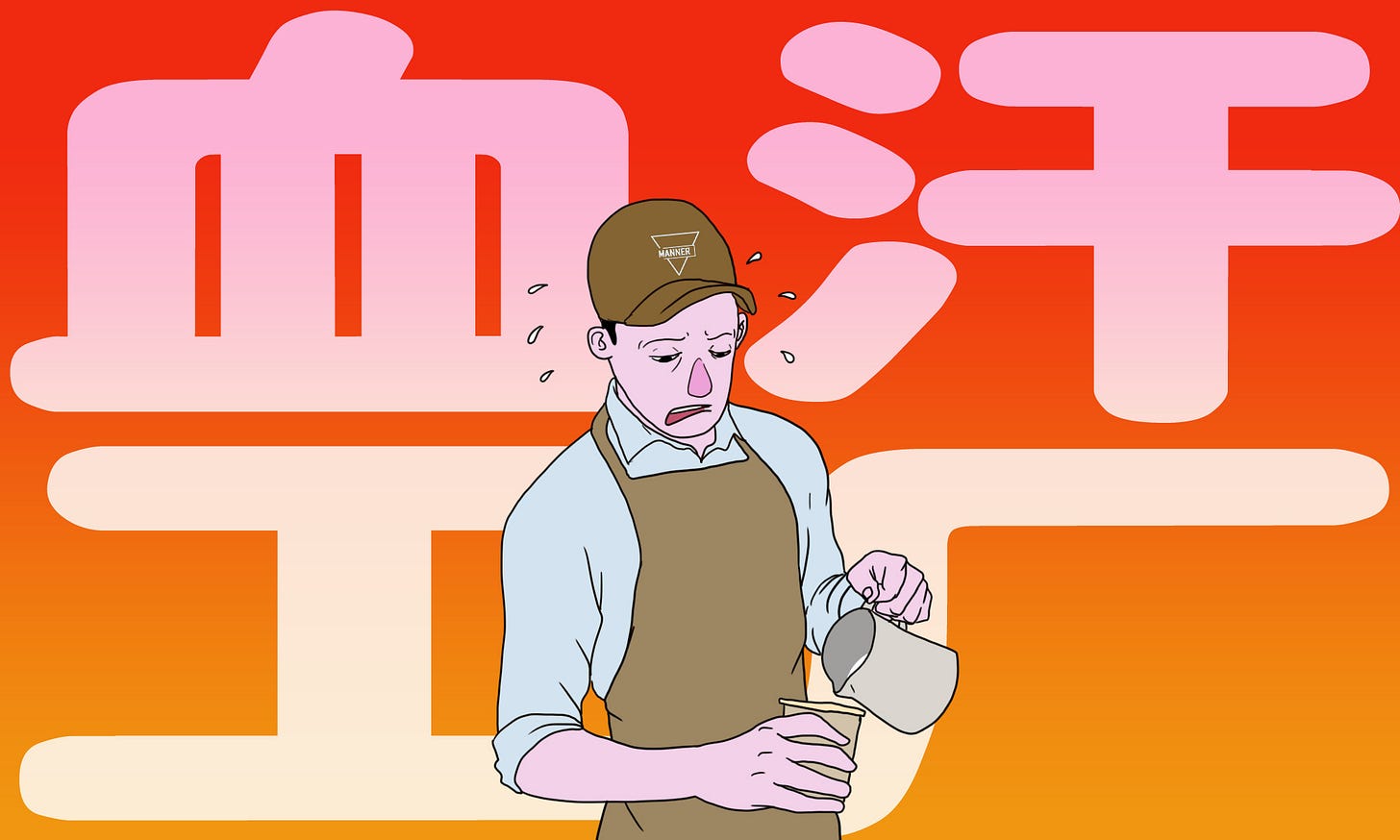“Sweatshop" — Phrase of the Week
One of China's hottest coffee chains gets the wrong kind of attention because of terrible working conditions

Our phrase of the week is: “sweatshop” (血汗工厂 xuèhàn gōngchǎng)
Context
Clashes between staff and customers at Manner Coffee, a rapidly expanding coffee chain in China, have hit hot search lists with security camera footage of incidents going viral on social media.
In one incident, a customer is seen rushing a barista for her order, threatening to complain for slow service. The barista became emotional, started yelling at the customer uncontrollably, and threw a cup of coffee powder in her face.
On the same day, at another Manner coffee shop, a customer is seen nagging the barista to complete her order first because she had a plane to catch. The barista responded calmly, but the customer quickly became aggressive, and started to film him with her mobile phone demanding to know his name. The confrontation quickly escalated into a physical fight.
Manner released a statement apologizing for the incidents confirming the female barista had been sacked, and the male barista had been disciplined and had come to mutual settlement with the female customer.
Commentary in social media quickly shifted to the working conditions in Manner Coffee.
According to interviews with current and former employees, working conditions at Manner are intense, with long shifts and virtually no breaks. Employees are also expected to work overtime, and be ready at any time to be dispatched to any store by the company.
Manner Coffee's proposition to its customers is supposed to be low-price, high quality take-away coffee. Customers expect their coffee to be delivered quickly. When that doesn't happen they become impatient.
The clashes seen in Shanghai last week are a consequence of high pressure working conditions at the company:
Over the years, Manner itself has increasingly become a sweatshop for its employees.
几年过去,Manner自己也变得越来越像打工人的血汗工厂。
Jǐ nián guòqù, Manner zìjǐ yě biàn de yuè lái yuè xiàng dǎgōngrén de xuèhàn gōngchǎng.
And with that we have our Sinica Phrase of the Week.
What it means
”Sweatshop" is a four-character phrase in Chinese, which directly translates as "blood sweat" (血汗 xuèhàn), and "factory" (工厂 gōngchǎng). The term, "blood sweat" (血汗) in Chinese is a metaphor for “hard work”, similar to the English phrase, "blood, sweat, and tears".
"Sweatshop" is originally an English phrase which became absorbed into modern Chinese. It was first coined in 1850 by British Author, Charles Kingsley, in his book, Cheap Clothes and Nasty, describing how textiles and clothing factories at that time in London and New York were like "sweating systems" with terrible working conditions.
"Sweatshop" became a common phrase describing a factory or workshop, often in the clothing industry, where workers were treated unfairly, with low wages, working long hours, and under poor working conditions.
The imported Chinese equivalent of the phrase, "blood-sweat-factory" (血汗工厂 xuèhàn gōngchǎng), came into use in the 1980's, first in Taiwan, describing the working conditions in companies like Foxconn (富士康), and later describing describing factories on the Mainland, usually clothing and textiles factories.
As more people became employed in white collar jobs, as China continued to modernise, the phrase "sweatshop" also described the working conditions in China's major tech firms, or in this case the service industry.
Other phrases from the world of factory operations and heavy industry are also common metaphors for poor working conditions in the workplace in China. For example, "production line" (流水线 liú shuǐ xiàn) in Chinese can describe repetitive and monotonous work, such as making coffees for 11 hours per day.
At Manner Coffee, the underpaid, overworked baristas not only have to cope with the exploitation of their employer, but also the unreasonable expectations of customers who want their coffee immediately.
That is to say, based on the reports coming out of China this week, working in Manner Coffee is like a modern version of the "sweatshop".
Andrew Methven is the author of RealTime Mandarin, a resource to help you learn contemporary Chinese in context, and stay on top of the latest language trends in China.
Read more about how this story is being discussed in the Chinese media in this week’s RealTime Mandarin.


